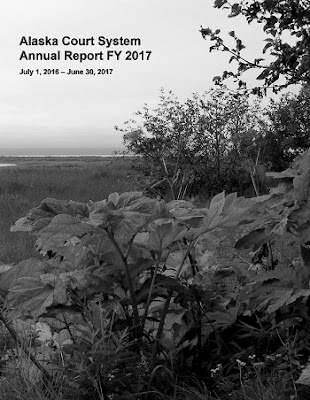![[Photo] Brad A. Myrstol](https://blogger.googleusercontent.com/img/b/R29vZ2xl/AVvXsEinHtDMxKtVHpqm9xKLMC18wKAp_GkuoZSkE5YaEzyVx3HOVrVPzUcy-5US1wc1w05-Z4jwTdLldzQCqRGyde9RjnvwIBalrBx87HHm4TvovX2hFNecH2akgfe6_GmiM2A0VWuwNH_eNfI/s320/myrstol-brad.hs.2012.a.jpg) |
Dr. Brad A. Myrstol,
Director of the UAA Justice Center |
UAA College of Health Dean Jeff Jessee is pleased to announce that after a national search,
Dr. Brad Myrstol, has been appointed director of the Justice Center. Dr. Myrstol, who has been interim director since August 2017, is also director of the Alaska Justice Information Center (AJiC) and has been with the Justice Center as a faculty member since 2009. Previously he worked at the Justice Center as a research professional from 2002 to 2006.
"We are all extremely fortunate to have such a talented leader for the Justice Center," Dean Jessee said. "He is deeply committed to the Justice Center's mission of leading Alaska toward a safer, healthier and more just society."
Dr. Myrstol received his Ph.D. in Criminal Justice from Indiana University in 2006. He has served as the principal or co-principal investigator on a variety of Alaska justice topics including the offending trajectories of juveniles, the criminal case processing of domestic violence, sexual assault and sexual abuse of a minor cases, the role and impact of Alaska’s Village Public Safety Officer (VPSO) program on the state’s response to domestic violence and sexual assault, sex offender recidivism trajectories, sexual violence victimization among university students, the structure and organization of policing in Alaska, as well as factors impacting charging, time-to-disposition, and sentencing outcomes in felony cases.
While at UAA, Dr. Myrstol has received over $1 million in research funding from sources including the U.S. Department of Justice, Bureau of Justice Statistics, U.S. Department of Justice, National Institute of Justice, as well as Alaska state and local agencies.
Dr. Myrstol is currently the principal investigator on Alaska's Results First Initiative, a partnership with the Pew-MacArthur Trust that provides analysis of evidence-based programs giving policymakers a tool to better understand the relationship between the state’s monetary investment in programs and the return on that investment in terms of the benefits of reduced recidivism.
"I look forward to supporting Dr. Myrstol and the work of the Justice Center," Dean Jessee said.
 On Thursday, March 1, the Society of Law and Justice welcomes Rashika Rakibullah, lead organizer for the American Civil Liberties Union of Alaska, as guest speaker at their general meeting. Rakibullah will talk about her job and how she has come to this field of work. The meeting begins at 6p.m. in SSB 118 and is open to the public.
On Thursday, March 1, the Society of Law and Justice welcomes Rashika Rakibullah, lead organizer for the American Civil Liberties Union of Alaska, as guest speaker at their general meeting. Rakibullah will talk about her job and how she has come to this field of work. The meeting begins at 6p.m. in SSB 118 and is open to the public.







![[Photo] Brad A. Myrstol](https://blogger.googleusercontent.com/img/b/R29vZ2xl/AVvXsEinHtDMxKtVHpqm9xKLMC18wKAp_GkuoZSkE5YaEzyVx3HOVrVPzUcy-5US1wc1w05-Z4jwTdLldzQCqRGyde9RjnvwIBalrBx87HHm4TvovX2hFNecH2akgfe6_GmiM2A0VWuwNH_eNfI/s320/myrstol-brad.hs.2012.a.jpg)

 Anchorage Police Citizen Academy Alumni Association (APCAAA)
Anchorage Police Citizen Academy Alumni Association (APCAAA)